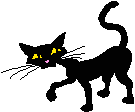Cardiovascular Ailments
and Heart Disease
in Cats
|
|
Please Help Pets with a Small Donation of One Dollar
Feline Heart Disease
By: Dr. Jane Bicks
Where the heart is concerned, a cat is never too old or too young to have
problems. Cardiovascular ailments can afflict cats of all ages.
Although there is a wide variety of heart problems, differing in severity and symptoms (which
range from simple weakness, mild coughing, weight loss, labored breathing,
abdominal distention and collapse), all are cause for concern and treatment.
The proper functioning of a cat's vital organs depends on the health of the
cardiovascular system. In order to retain and restore his health, dietary
management is essential.
Pass on the Salt
Reducing the cat's intake of sodium is of primary importance, since salt
causes water retention. Water retention puts a heavier load on the kidneys,
already overworked and under- fueled because of impaired cardiac function, and
can result in heart failure.
Knowing the Right "No's" for the Heart
- No smoked foods, or any luncheon meats. Also, avoid shellfish,
canned soups, foods with monosodium glutamate (MSG, Accent), processed
cheeses, breads and cereals, canned vegetables,
and people food in general.
- No cat foods that list salt as an ingredient. (Commercial cat
ingredients already contain salt, so an additional listing means there's
much more in these than your cat can handle safely.)
- No protein other than that of the highest utilizable quality. You don't
want any more waste material going through the kidneys than necessary, and
you do want your pet to get the best amino acids possible.
- No water treated by a home water softener. Home water softeners ad
sodium. If you are unsure about the sodium content of your tap water,
provide distilled water and encourage your pet to drink.
- No added supplements if you are feeding your pet a prescription diet,
such as Feline H/D, CV-Formula Feline Diet, etc. Prescription diets are
carefully formulated and supplement additions, with the exception of
brewer's or torula yeast (which is advised because of it's B vitamins and
anti-stress properties), and vegetable enzymes, can undermine the nutrient
ratio designed to maintain a correct electrolyte balance.
A few Heart-to-Heart Tips & Cautions
- If your cat is over weight, decrease portion sizes of his low salt
meals. Unless specifically prescribed, avoid feeding prepared reducing
diets, since they are usually high in salts.
- Chopped cucumbers and dandelions are natural diuretics, which increase
urine excretion, and can be added to the food.
- Supplement the cat's diet with a balanced vitamin B complex (or brewer's
or torula yeast), and vitamin C daily, and 50 to 100 IU of vitamin E
daily. Ask your veterinarian first, however.
- If you are preparing homemade meals, do not use baking soda as an
ingredient.
- Exercise is important, but consult your vet on how much your cat is
allowed.

|